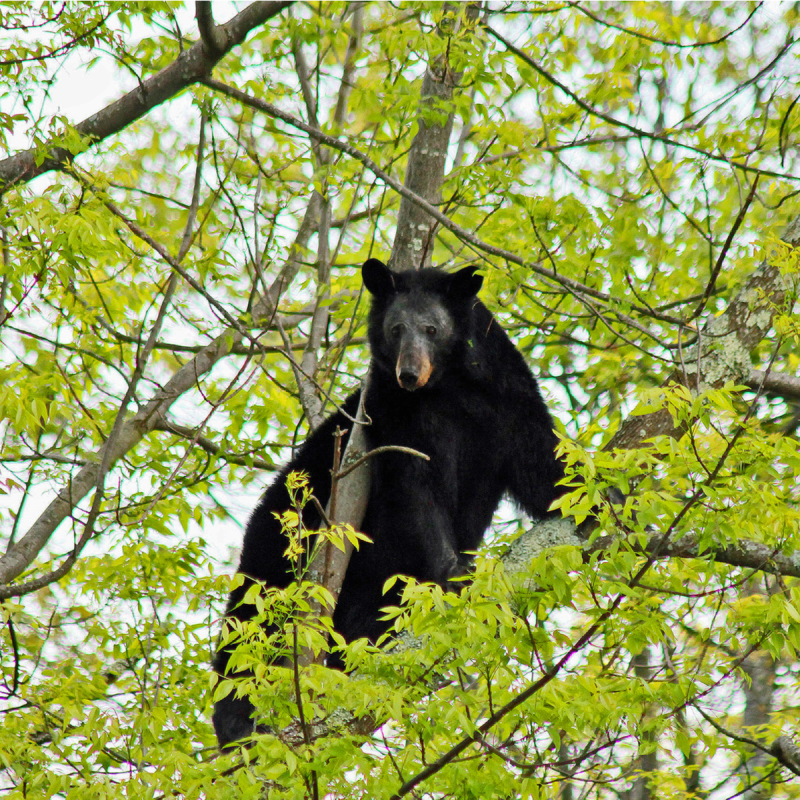
(Photo Credit: Vicki L. Miller / Shutterstock.com)
It’s that time of year again in western North Carolina.
Videos by TravelAwaits
Bears that are “opportunistically” looking for food have been getting uncomfortably close to campers and their campsites. In some cases, the bears have even taken objects containing food out of the campsites.
As a result, the U.S. Forest Service issued a warning for people traveling to the Pisgah and Nantahala National Forests, specifically for the Pisgah, Appalachian, and Nantahala Ranger Districts.
“Forest visitors have reported bears tearing down bear bags from trees, carrying off backpacks, spending hours near campsites, and being unaffected by efforts to scare them away,” the Forest Service said in a statement.
No injuries have been reported and the Forest Service has not released details about specific bear encounters.
A Disturbing Trend
This is the second summer in a row that bear alerts have been issued for Pisgah and Nantahala national forests. In June 2021, reports of aggressive bears led to a temporary ban on camping along the Appalachian Trail in the area, from Double Springs Shelter to Backbone Rock Side Trail.
“Encounters include bears taking down bear bags stored hanging from a tree and rifling through camping supplies and gear. The bears will often stay in the area of the incident for multiple hours, and they have a large range that can extend several miles,” the Forest Service explained. “This time of the year, black bears are opportunistically looking for food that campers and trail users bring on their trips.”
Then last September, a picnicking couple was injured by a bear along the Blue Ridge Parkway in North Carolina.
The bear attack occurred while the couple was having a picnic on a grassy hill along the Blue Ridge Parkway near the Folk Art Center in Asheville. They were alerted of the bear’s presence by their dog.
“The unleashed dog ran toward the bear while barking loudly. Likely aggravated by the dog, the bear acted defensively toward the dog and the couple,” according to the National Park Service.
“Over the next several minutes, there were repeated attacks by the bear while the couple retreated with their dog to the safety of their vehicle.”
Due to the “bold and aggressive” attack, the National Park Service temporarily closed all trails in the area, and temporarily prohibited picnicking in the area around the Asheville Visitor Center and adjacent parking areas.
Be Bear Aware
Of the three bear species in North America, black bears are the most abundant and widely distributed, according to the Forest Service.
Black bears, which live for 15–25 years, range from 100 to 600 pounds — depending on their age, sex, and the season, the National Park Service explains. They are about 3 feet tall at the shoulder, but when standing upright, they are 5–7 feet tall.
If you’re going to be in bear country, it’s important to always “Be bear aware,” the Forest Service notes.
“Bears remember and recognize familiar food sources like favorite berry patches, decaying logs swarming with delectable insects, and streams and rivers teeming with fish that provide much needed fat and protein,” the Forest Service explains. “But bears also remember that human packs, campsites, and dwellings offer tempting options. While bears are attracted to any edible food, they also might try to feast on items we might not consider edible, such as toothpaste, shampoo, lotion, soap, cooking utensils, empty cans, wrappers, coolers, and pet food.”
When in bear country, visitors should not store food in tents. Instead, food — as well as scented items like toothpaste — should be properly stored in a hard-sided bear-resistant container. In addition to never leaving food unattended, visitors should clean up food or garbage around the campsite.
You can learn more about how to stay safe in bear country here.
You can also find all of our national park content here, including:
